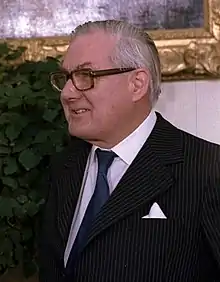Peter Jay (diplomat)
Peter Jay (born 7 February 1937) is an English economist, broadcaster and former diplomat.
Peter Jay | |
|---|---|
| British Ambassador to the United States | |
| In office 1977–1979 | |
| Monarch | Elizabeth II |
| President | Jimmy Carter |
| Prime Minister | James Callaghan |
| Preceded by | Peter Ramsbotham |
| Succeeded by | Nicholas Henderson |
| Personal details | |
| Born | 7 February 1937 London, England |
| Spouse(s) | Emma Bettina Thornton
(m. 1986) |
| Children | 7 |
| Parents | |
| Alma mater | Christ Church, Oxford |
Life
Peter Jay is the son of Douglas Jay, Baron Jay, and Peggy Jay, both of whom were Labour Party politicians. He was educated at The Dragon School, Oxford (the alma mater of several senior Labour politicians, including Hugh Gaitskell), followed by Winchester College[1] (where he was Senior Commoner Prefect) and Christ Church, Oxford, where he graduated with a first class honours degree in PPE.[1] In Trinity Term 1960, he was president of the Oxford Union.[2] He was commissioned in the Royal Navy, then worked as a civil servant at HM Treasury before becoming a journalist and, for 10 years, economics editor with The Times.
Jay married Margaret Callaghan, the daughter of Labour politician James Callaghan, in 1961. In 1977, when his father-in-law had become Prime Minister, Jay was appointed to the post of Ambassador to the United States by the Foreign Secretary, his friend David Owen. As Jay was just 40 years old, was not a diplomat and had never held any public office, this appointment caused some controversy and accusations of nepotism.[1]
He married secondly, in 1986, Emma Bettina, daughter of the museum curator and writer Peter Thornton. He has seven children.[3]
Career
In the early 1970s, Jay became the principal presenter of the London Weekend Television Sunday news analysis programme Weekend World. He co-authored, with his friend John Birt, a series of articles for The Times in 1972, in which they criticised standard television journalism and developed what came to be called their "mission to explain".
As leader of a consortium of high-profile media figures, including Angela Rippon, David Frost, Michael Parkinson and Anna Ford, he won the franchise and became the founding chairman of TV-am, a breakfast TV station launched by the consortium. When the initial focus on news and current affairs did not yield economic success, he was fired by his friend and co-director Jonathan Aitken.[1]
Jay's career took a surprising turn when he became Chief of Staff to Robert Maxwell during his most high-profile years. His wife Margaret led Maxwell's Aids Foundation around the same time, where she met her present husband Professor Mike Adler.
Peter Jay later returned to broadcast journalism; John Birt appointed him Economics Editor of the BBC, and he presented editions of The Money Programme.
He wrote The Road to Riches or the Wealth of Man (2000, Weidenfeld & Nicolson) and presented a related BBC TV documentary series. He also co-wrote with Michael Stewart the speculative historical novel Apocalypse 2000: Economic Breakdown and the Suicide of Democracy.
While his father was closely linked with Keynesian economics, Jay increasingly identified himself with the new 'monetarian' school associated with Milton Friedman, a man he was close friends with.[4] He has also debated with Friedman and Thomas Sowell, including two episodes of Friedman's TV series Free to Choose (1980). Jay was credited with helping write Callaghan's speech at the 1976 Labour Party Conference.[5] The speech is seen as something of a turning point with Callaghan declaring 'We used to think that you could spend your way out of a recession, and increase employment by cutting taxes and boosting Government spending. I tell you in all candour that that option no longer exists', a rejection of the previously dominant Keynesian logic and a reflection of the ascendency of Monetarism.[6] Jay used his column in the Times to advocate for neoliberal policies in Britain.
He was also the moderator of the discussions in the British version of Free to Choose.[7]
He was a non-executive director of the Bank of England from June 2003 to May 2009.[8] He has been a governor of the Ditchley Foundation since 1982, and is a councillor on Woodstock Town Council.
References
- "Jay talking". The Observer. London. 18 June 2000. Retrieved 11 January 2011.
- Churchill College, Cambridge: The Papers of Peter Jay 4/2/1.
- Debrett's Peerage and Baronetage 1990, ed. Patrick Montague-Smith, pg 686
- Beckett, Andy (2009). When the Lights Went Out: Britain in the Seventies. London: Faber & Faber. p. 338.
- Meredith, Stephen (2014). Crines, Andrew (ed.). Labour Orators from Aneurin Bevan to Gordon Brown. Manchester: Manchester University Press. pp. 76–92. ISBN 9780719089800.
- Callaghan, James. "Leader's speech, Blackpool 1976". British Political Speeches. Retrieved 21 October 2020.
- Milton & Rose Friedman, Two Lucky People. Memoirs, Chicago & London: The University of Chicago Press, 1998, p. 499;L Borders, Max (25 January 2011) Who is Francis Fox Piven?, Washington Examiner
- Peter Jay. "Peter Jay: Executive Profile & Biography - Businessweek". Investing.businessweek.com. Retrieved 6 June 2014.
External links
- Catalogue of the Peter Jay papers at the Churchill Archives Centre
- Interview with Noam Chomsky on Anarcho-Syndicalism
- Debate between Jay, Milton Friedman, and Thomas Sowell
| Diplomatic posts | ||
|---|---|---|
| Preceded by Sir Peter Ramsbotham |
British Ambassador to the United States 1977–1979 |
Succeeded by Sir Nicholas Henderson |
